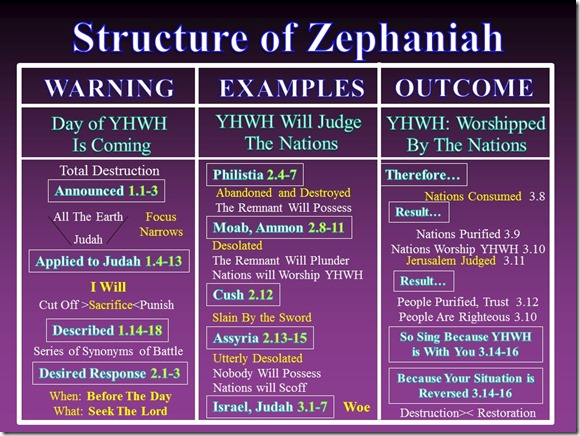The Hebrew name for Zephaniah is צְפַנְיָה (Tzefanyah). The name Zephaniah translates to "Yahweh has hidden" or "Yahweh has treasured." The etymology of Zephaniah's name carries a depth of meaning, potentially signifying protection or divine safeguarding during perilous times, which resonates with the themes of judgment and eventual restoration found within the Book of Zephaniah.
The Book of Zephaniah emerges as a profound narrative in the Minor Prophets' corpus, offering a vivid glimpse into the impending "Day of the Lord" and the divine call for repentance. The unique lineage and ministry of Zephaniah craft a narrative that intertwines divine judgment with a glimmer of hope. This essay seeks to explore Zephaniah's biography, delve into his prophecies, and analyze the implications, reception, and the consequent unfolding of his oracles concerning Israel, as portrayed in the King James Version of the Bible.
Biographical Background:
Zephaniah's prophecy is rooted in a precise historical and genealogical context, being the great-grandson of King Hezekiah. His ministry likely occurred during the reign of King Josiah, a period marked by religious reform and political uncertainty.
Prophetic Utterances:
Zephaniah’s prophecies are characterized by a poignant depiction of the "Day of the Lord" (Zephaniah 1:7-18), a day of wrath and judgment against sin. His narrative extends to the nations surrounding Judah, portraying a comprehensive divine assessment (Zephaniah 2). Amidst these stern warnings, Zephaniah also unveils a message of hope and restoration for a remnant (Zephaniah 3:12-20).
Implications:
Zephaniah's prophecies accentuate the divine abhorrence of sin and the inevitable judgment awaiting unrepentant hearts. His message underscores the necessity of repentance and the boundless divine mercy awaiting those who turn back to God.
Reception and Repentance:
The temporal proximity of Zephaniah's ministry to King Josiah's reforms suggests a possible influence or at least a congruence of religious zeal. The reforms undertaken by Josiah (2 Kings 22-23) might reflect a broader societal acknowledgment of the prophetic message.
Consequences for Israel:
The divine judgments, as outlined by Zephaniah, portray a stark reality awaiting Israel due to its disobedience. However, the prospect of a remnant's restoration offers a glimpse of hope amidst the prophesied calamity.
"Day of the Lord" and Call to Repentance:
Zephaniah's portrayal of the "Day of the Lord" is foundational in understanding the biblical narrative concerning divine judgment. His call to repentance (Zephaniah 2:1-3) lays bare the divine desire for reconciliation, even in the face of impending judgment.
An Analysis of Joel and Zephaniah’s Day of the Lord Prophecies:
The prophetic concept of the "Day of the Lord" looms large within the Old Testament, painting a multifaceted picture of divine intervention marked by both judgment and salvation. The prophets Joel and Zephaniah, another tale of two prophets, each from distinct historical and social contexts, unfold this concept with varied emphases and thematic nuances. This essay seeks to compare and contrast Joel and Zephaniah's prophecies concerning the "Day of the Lord," as rendered in the King James Version of the Bible, to elucidate the broader theological and eschatological contours reflected in their messages.
Thematic Emphasis:
Joel’s depiction of the "Day of the Lord" is enmeshed in agrarian imagery, portraying it as a time of unparalleled calamity initially through a locust invasion (Joel 1:4; 2:1-11). Conversely, Zephaniah’s portrayal is grounded in the sociopolitical reality of his time, extending judgment to the surrounding nations (Zephaniah 2).
The Spectrum of Judgment and Restoration:
Both prophets oscillate between the themes of judgment and restoration. However, Joel leans more towards the hope of restoration and divine blessing post-repentance (Joel 2:18-32), while Zephaniah places a stronger emphasis on the impending judgment with a glimpse of restoration towards the end of his book (Zephaniah 3:9-20).
Temporal Framework:
Joel’s prophecy encapsulates an immediate and eschatological fulfillment. The locust invasion serves as a precursor to the greater "Day of the Lord." Zephaniah’s prophecy, on the other hand, seems to be more focused on the near future, particularly the impending doom on Judah and the surrounding nations.
The Call to Repentance:
Both prophets underscore the call to repentance. Joel emphasizes communal repentance and the restoration that follows (Joel 2:12-17), while Zephaniah underscores a call to seek righteousness and humility to be hidden in the day of the Lord’s anger (Zephaniah 2:3).
Eschatological Outpouring:
Joel’s prophecy culminates in an eschatological outpouring of God’s Spirit (Joel 2:28-32), portraying a universal scope. Zephaniah, while also portraying a universal scope in God’s judgment, tends to focus more on the restoration of a remnant of Israel (Zephaniah 3:12-20).
The “Day of the Lord,” as articulated by Joel and Zephaniah, presents a rich tapestry of divine encounter, elucidating the justice and mercy of God in the face of human failure and repentance. Through the comparative lens, one discerns the nuanced manner in which the prophets, rooted in their respective contexts, navigate the terrains of judgment and hope. This comparative analysis not only enriches the understanding of prophetic literature but also unveils the dynamic nature of divine engagement with humanity across different temporal and situational horizons.
The Book of Zephaniah provides a profound exploration of divine justice, mercy, and the enduring call to repentance. Through the lens of Zephaniah’s prophecies, the narrative unveils a divine narrative that oscillates between judgment and mercy, offering a timeless reflection on the human propensity towards disobedience and the inexhaustible divine mercy awaiting a repentant heart.



No comments:
Post a Comment